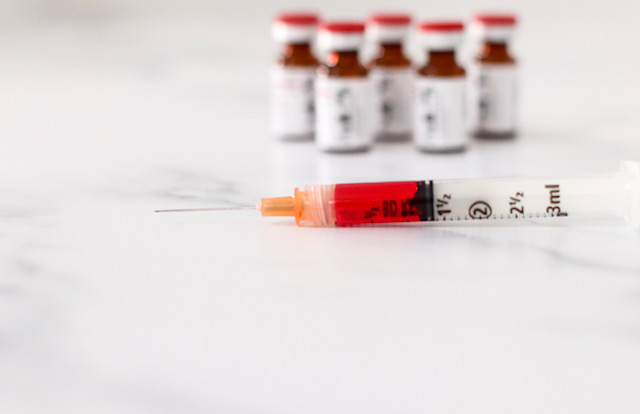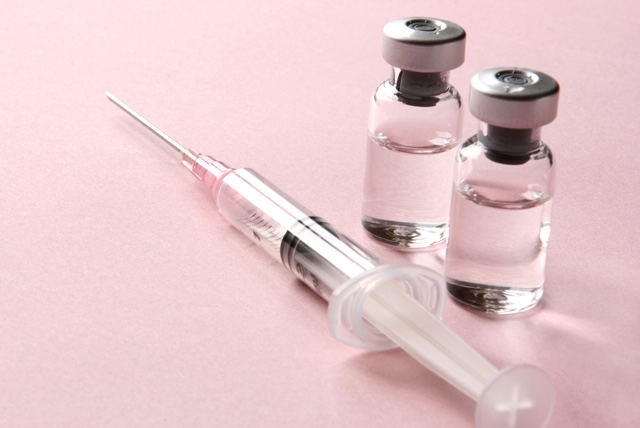Vitamins
Vitamin B12 Injections
Vitamin B12, also known as cobalamin, is a water soluble vitamin involved in the metabolism of every cell of the human body. It is a cofactor in DNA synthesis, and in both fatty acid and amino acid
metabolism. It is particularly important in the normal functioning of the nervous system via its role in the synthesis of myelin, and in the maturation of developing red blood cells in the bone marrow.
Vitamin B12 has an extensive list of potential health benefits, including:
- Energy
- Healthy red blood cells
- Nervous system
- Homocysteine levels and heart health
- Memory
- Hair skin and nails
The most common signs of vitamin b12 deficiency include:
- Fatigue
- Muscle weakness
- Unexplained weight loss
- Shortness of breath
- Vision problems
- Poor memory
- Constipation
- Bleeding gums and mouth sores


Vitamin C Injections
Vitamin C, also known as ascorbic acid, is an essential nutrient that keeps the body functioning.
Found in foods and dietary supplements, it aids in many biological functions, including the synthesis
of collagen , the healing of wounds, and the repair and maintenance of cartilage, bones, and teeth.
Vitamin C is also an antioxidant, meaning that it can neutralize free radicals that can damage cells at
the genetic level. Vitamin C has been used historically to prevent or treat scurvy
and other illnesses associated with vitamin C deficiency. Today, it is widely touted as a natural defence against the common colds. Although vitamin C is considered to be an "immune booster," there is little evidence that taking it can actually prevent or treat an infection.
Health Benefits
The one condition vitamin C can most definitely treat is vitamin C deficiency. According to research
from the Centres for Disease Control and Prevention (CDC), an estimated 7.1% of the U.K. population can be classified as being vitamin C deficient. Those with
a severe dietary deficiency can develop scurvy, characterized by bruising, bleeding gums, weakness, fatigue, and rash.
The symptoms are as a result of vitamin C deficiencies
- Weakness
- Feeling fatigue
- Sore arms or legs
- Gum diseases
- Easy bleeding
- Roughness of the skin
- Poor wound healing
B Complex Injections
Researches and studies have proved that Vitamin B complex injections are more efficient than tablets, gels or liquids. This is because the digestive system, stomach acids and enzymes attack the molecular structure of B vitamins when consumed in the form of tablets or gels. But in case of injections, neither acids nor enzymes are able to attack the vitamins. This results in higher rate of absorption and retention of B vitamins with faster and effective results. Many countries use these injections as dietary supplements.
Vitamin B complex injection is used by many individuals for an immediate boost in energy and to aid in weight loss. These injections are most useful for fatigue caused due to nerve damage, diabetes, sciatica, tinnitus, effects of stress, chronic disease, B12 deficiency and a number of other conditions. Vitamin B is not actually a single vitamin but is a collection of 8 different vitamins that form the group of B vitamins. These vitamins are all water soluble which means that they can be easily transported around the body.
Vitamin Complex
B1 (thiamine):
The water soluble vitamin that is required for the proper metabolism of starch and sugar in order to provide energy to the body.
B1 l helps the heart and other muscles function properly.
B1 plays an essential role in metabolism by helping convert nutrients into energy.
B2 (riboflavin):
B2 is mainly involved in energy metabolism and helps the thyroid function properly.
Vitamin B2 aids in weight loss by releasing the unused energy in the body and preventing unused energy from turning into fat.
Vitamin B2 is crucial for the metabolism of fats, proteins, and carbohydrates.
B2 helps convert food into energy and also acts as an antioxidant.
B3 (niacin):
B3 support healthy carbohydrate metabolism.
The water soluble vitamin Niacin is essential for the body to convert carbohydrates, fat and alcohol into energy.
Vitamin B3 aids in the normal maintenance of thyroid hormone production.
It helps maintain skin health and supports the normal function of the nervous system and the gastrointestinal tract.
Vitamin B4 (Choline)
B4 is an essential and vital nutrient for our health.
Vitamin B4 is also one of the water soluble vitamins that aids in weight loss.
This nutrient is a fat emulsifier that works with the nutrient inositol. Choline and inositol use the cholesterol and fats in the body to prevent weight gain and promote weight loss.
B5 (pantothenic acid):
Vitamin B5 plays an important role in weight loss.
Vitamin B5 is involved in energy production and helps to control fat metabolism.
Pantothenic acid is needed to metabolize carbohydrates, proteins, fats and alcohol as well as produce red blood cells and steroid hormones.
Vitamin B5 also aids in digestion and helps break down fat and carbohydrates, thus giving more energy and boosting one's metabolism, which also helps in weight loss.
B6 (pyridoxine):
B6 the water soluble vitamin plays an integral role in the metabolism of fats, particularly fatty acids which are unsaturated and help to supply fuel to cells, which are then able to burn energy.
Vitamin B6 helps with the regulation and production of the thyroid.
B6 is also required for protein and carbohydrate metabolism.
Vitamin B6 helps the pancreas produce enzymes that aid indigestion. Proper digestion will make one feel full longer, thus resulting in weight loss.
B7 (biotin):
Vitamin B7 is needed for energy metabolism, fat synthesis, amino acid metabolism and glycogen synthesis.
Biotin improves blood sugar control.
People who exercise often have an increased need for biotin for several reasons: Increased metabolism resulting in the loss of this vitamin in urine or sweat, need for tissue repair and maintenance.
B7 is essential for carbohydrate and fat metabolism and regulates gene expression.


Hay Fever Injections (Kenalog-40)
What is Hay Fever
Hay fever (seasonal allergic rhinitis) is caused by an allergic reaction to pollen. It can trigger sneezing, a blocked or runny nose and itchy eyes. It is normal for it to appear at the same time each year.
Severe hay fever symptoms can ruin peoples’ summers and have a detrimental effect on quality of life. It may also prevent people from being able to work optimally.
The UK is particularly affected by pollen with a mixture of flowers and trees such as silver birch and rape seed most likely to worsen symptoms of hay fever. It is estimated that there is 3 billion trees in the UK! Working out at nearly 50 trees per person. Allergic rhinitis is becoming more common. Many people with hay fever also have asthma and eczema. These are called atopic conditions or atopy. You’re more likely to have atopic conditions if they run in your family.
Symptoms Include:
- Sneezing
- Blocked or runny nose (rhinorrhoea)
- Itchy eyes, nose, throat and roof of your mouth
- Red eyes, which water
- Postnasal drip (mucus dripping down your throat from the back of your nose)
this may make you cough
- Headaches, caused by a stuffy nose
- Hay Fever Injections (Kenalog – 40) is a steroid that prevents the release of substances in the body that cause inflammation.
Clients cannot have any other injection for a month after the Kenalog-40 injection. Including;
dermal filler, botox, b12, vitamin C and vitamin B complex.
